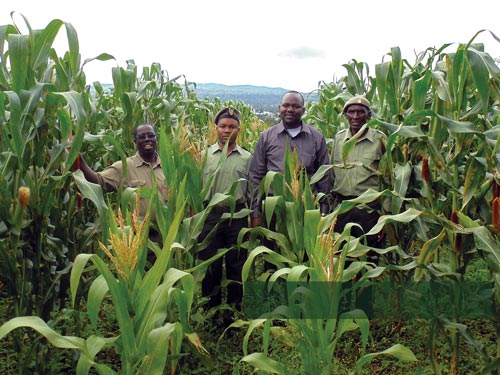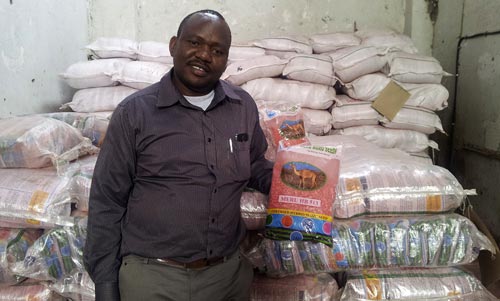
Picture: Biswanath Das/CIMMYT
Seed companies are key partners in delivering improved seed to smallholder farmers in Africa, the key beneficiaries of agricultural research. Meru Agro in Tanzania is one such partner, producing ‘fertilizer-friendly’ maize varieties with support from the Improved Maize for African Soils (IMAS) project. “We call the varieties ‘fertilizer-friendly’ because they use the small amounts of fertilizer that smallholder farmers in Africa apply more efficiently,” said Dr. Biswanath Das, CIMMYT maize breeder. Since 2013, Meru Agro has been multiplying HB513, a fertilizer-friendly and drought-tolerant hybrid. The company has produced over 1,200 metric tons of HB513 seed, which can potentially reach 50,000 smallholder farmers in the mid-elevation regions of Tanzania in the upcoming cropping season.
Promotion
The small-to-medium enterprise uses innovative methods to promote its maize varieties. The company runs extensive demonstration plots at key locations and gives away ‘promo packs’ to farmers during field days. “These are 100 gram packs that we give away through the agrodealers. The packs allow farmers to test the varieties for themselves and compare them with what they are growing,” said Watanga Chacha, the company’s chief executive officer. The company also participates in the annual NaneNane agricultural shows held in Arusha, Mbeya and Mwanza in August where they showcase their varieties. “When they plant for NaneNane, they do it at intervals to ensure that farmers can see how the hybrid performs at different growth stages,” said Dr. Mosisa Worku Regasa, CIMMYT seed systems specialist.

Picture: Biswanath Das/CIMMYT
Meru Agro has embraced radio as a marketing tool. “We use radio advertisements to reach farmers in our target areas,” said Chacha. “We have the advertisements recorded in the local accents which help the audience identify with them.” The company also invests in extension, training farmers in good agricultural practices augmented with training for agro-dealers. “This has contributed to the expansion of our distribution network as farmers get to know the merits of the maize varieties we are selling,” adds Chacha. “The training gives farmers confidence that they are buying a good variety by knowing the merits of the varieties in advance.”
Rapid Growth
Meru Agro has grown from an agro-dealer that began operations in October 2006 and evolved into a seed and farm input supplier in 2009. “We started with three employees, we now have 34 people, eight graduates, five diploma holders and one master’s degree holder,” says the entrepreneur. “A good strategy does not automatically translate to good performance. The team you have makes the difference – their technical skills and capacity to execute the strategy makes the difference,” said Chacha, crediting his staff for contributing to the company’s success.
Seed production and breeding research done by organizations such as CIMMYT and the national agriculture institutes benefit small seed companies like Meru Agro. “We have released four maize hybrid varieties in collaboration with CIMMYT and we are producing some open-pollinated varieties (OPVs) that have been released by the national program in Tanzania,” said Chacha. The company’s product portfolio leans towards hybrid seeds; this is informed by the market response. “Most farmers in Tanzania are now shifting from OPVs to hybrids.” The company is planning to establish a breeding unit in the near future. In the meantime, it relies on public goods derived from breeding research produced by CIMMYT and the national agriculture institute.
The company is partnering with other agencies involved in seed distribution in Tanzanian including the Tanzania Agricultural Partnerships (TAP), Farm Input Promotional Services (FIPS) and the Government Farm Input Subsidy Program to distribute 400,000 two-kilogram packs of maize seed to smallholder farmers. “We are targeting smallholder farmers, some of whom have very little land, between one-quarter of an acre to three acres,” said Chacha. “In Tanzania, farmers prefer small packs of certified seed. There is a huge untapped market in Tanzania as maize is the staple crop,” said Chacha explaining the rationale behind their expansion plans.
“The IMAS program provided technical backstopping and financial support to Meru Agro for seed production of MERU HB 513 which is drought-tolerant, in addition to being nitrogen use efficient,” said Das. Meru Agro staff have participated in seed business management courses facilitated by CIMMYT, contributing to capacity building within the company. “The company has produced large volumes of certified seed,” said Regasa.
Challenges
“The seed business is challenging,” said Chacha. The CEO cites the high investment costs in machinery for seed cleaning, grading and packaging. Chacha says drought is one of the challenges that hamper their seed production as not all of it is done under irrigation. “It takes time to convince farmers,” added Chacha, citing promotion as another challenge.
Go back to IMAS Project Updates
 Nutrition, health and food security
Nutrition, health and food security 
